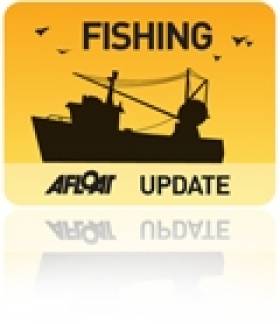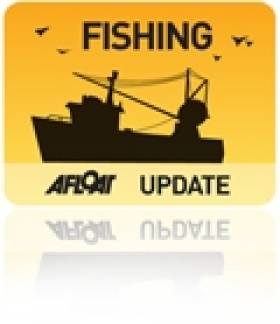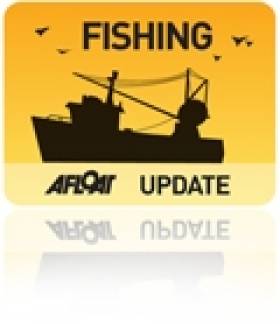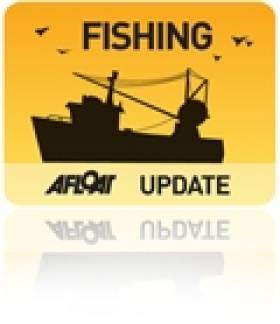Displaying items by tag: Sean Connick
Ministers Meet World's Biggest Seafood Company
The Minister for Agriculture, Fisheries and Food, Brendan Smith TD and Minister of State, Sean Connick TD, met yesterday with the CEO of Marine Harvest, one of the world's biggest seafood companies, which has extensive investment in the aquaculture industry right along the western seaboard of Ireland, to discuss the potential for significant expansion of the industry in Ireland.
Mr. Alf-Helge Aarskog CEO of the Norwegian based multi - national company and Mr Jan Feenstra CEO of its Irish operations, outlined to the Ministers the challenges, opportunities and potential for finfish production globally. The company's Irish fish farms, in Donegal, Mayo, Cork and Kerry, have been expanding production and hope to produce between 10 and 12,000 tonnes of salmon for export from Ireland this year. The company has been increasingly moving to the production of premium organic salmon and this year expect that 70% of their Irish production will be sold in prime European markets as organically produced fish.
The company, which currently employs 250 people in Ireland and 5,000 worldwide sees significant potential to double production and employment in Ireland over the next ten years. To achieve this the company sought to explore with Ministers how aquaculture activity can be best expanded and developed sustainably in existing and new offshore locations on the Irish coastline.
Both Ministers emphasised the synergies between the company's production plans and the broad strategic vision set out in the Government's 'Food Harvest 2020' report. The focus by Marine Harvest Ireland on the sustainable production of salmon for export , mainly through organic methods has very significant benefits for job protection and creation in communities around the coast.
Minister Smith said "Exports are fundamental to Ireland's economic recovery and role that Marine Harvest and other aquaculture operators can play in further expanding exports of seafood is hugely important." Minister Smith added that "Our seafood exports increased by 18% in value last year and our Government's Food Harvest 2020 strategy outlines the enormous export potential in this sector in coming years" .
Minister Sean Connick said that "I have over the last year focussed heavily on the Aquaculture sector as a driver of substantial permanent and sustainable employment in our coastal communities. I can see enormous potential for the expansion of both finfish & shellfish aquaculture. To this end, the expertise of my Department and it's Agencies is fully focussed on the sustainable development of the industry in line with the overall Government Strategy."
Minister Welcomes Improvement in Sea Lice Management on Salmon Farms
Minister of State (with responsibility for fisheries) Sean Connick TD today published the report of the National Implementation Group established in December 2008 to oversee the implementation of the Strategy for Improved Pest Control on Irish Salmon Farms, published in May 2008.
Over the course of the Implementation Group's work, the vast majority of sites maintained lice levels below treatment trigger levels and, in all instances when notices to treat were issued, effective treatment plans were put into practice. Arising from the positive results, the report contains a series of recommendations encompassing treatments, disease monitoring and management practices to continue the progress to date.
Commenting on the report, Minister Connick noted that "Pest control will always remain a challenge requiring active management on any farm. However it is heartening to see that since the introduction of the new Pest Management strategy there has been a sustained reduction in the level of egg-bearing lice on farms in spring time. This illustrates the benefits of co-ordinating efforts between scientists and industry and I commend the participants, including the members of the Group and all salmon farmers who took part in the work, for their mutual co-operation on this issue."
Both the report and the Strategy <http://www.agriculture.gov.ie/media/migration/publications/2008/SeaLiceControlStrategy.pdf> are available for download from the Publications section of the Department's website.
Mr. Sean Connick, T.D. Minister of State at the Department of Agriculture, Fisheries and Food welcomed the agreement reached after two days of talks in Brussels on 2011 quotas for the Irish fishing fleet.
The final agreement will deliver whitefish quotas worth some €116 million, including the protection of Ireland's €54 million prawn fishery. There will be a 10% increase in quota for Ireland's €75 million mackerel industry and a two thirds share, worth approximately €4 million, for Irish fishermen of the new boarfish industry.
Speaking at the end of the negotiations in the early hours of Wednesday (16 December), the Minister said
"The negotiations have been particularly challenging this year with the European Commission proposing cuts across many stocks of commercial importance for Ireland. Consulting with our fishing industry and NGOs, working with other Member States and concentrating on the scientific evidence, was, I believe key to securing a balanced sustainable package."
"This package will help underpin the economic future of our costal communities."
There will be 15% increase in haddock and whiting stocks in the Celtic Sea. While for the cod stocks off the North West and the Irish Sea, the quotas will be reduced by 25% in line with the Recovery Plan for these stocks. For Celtic Sea cod, the current quota level has been maintained for 2011 on the basis of new survey results from the State's Research Vessel "Celtic Explorer".
Minister Connick commented "By introducing new information on Celtic Sea cod, I secured agreement that the current level of TAC will continue into 2011, and may be increased during the year if the new survey results are confirmed by the scientists. However, given the poor state of cod stocks off the North West and in the Irish Sea, cuts were necessary".
Commenting on the 3% reduction in the prawn quota, the Minister said "Prawns are a very important fishery all around our coast. It is the most valuable catch for the Irish whitefish fleet worth €54 million. While the Commission originally proposed a 17% cut, I secured just a 3% decrease in the quota on the basis of a strong scientific case."
The quota for mackerel will be increased by 10%, and should be worth up to €75m in 2011. This is the most important fishery for the North West fleet based in Killybegs and is also important for the South West multi purpose fleet, supporting processing jobs in the coastal communities.
There were also increases in the quota for Celtic Sea herring of 30%, although there were cuts in the North West stock reflecting concerns about the state of those stocks.
Finally, Ireland secured the largest share in an important new fishery for boarfish that will be worth just under €4 million in 2011. The Irish fishing industry has been working with the scientific community to develop a management plan for boarfish, a mid-water shoaling species, now found in large volumes off the South West coast. The agreement reached in Brussels provides for a total allowable catch of some 33,000 tonnes, with two thirds going to Ireland.
Minister Connick commented "In an example of a successful investment in scientific research by industry, we have opened up a new fishery and secured the major stake in that industry. This ensures a new revenue stream for Irish industry into the future. We believe we can now develop a significant and sustainable fishery on this stock, in which we will continue to hold the largest share".
Grant Aid Announced for 129 Fisheries Projects
Grant-aid of €1,122,084 is being provided to support a total investment of €2,023,127 for safety upgrades on board fishing vessels, lobster conservation, the development of Environmental Management Systems for Ireland's fishing fleet, and a number of collectively based projects under the new Marine Environment Protection Scheme (MEPS).
"These projects will further support our fishing industry", said Minister Connick. "Based as they are on the principle of responsible fishing practices that result in premium quality Irish seafood, the environmental focus for many of these projects will be critical in sustaining Ireland's fisheries sector during this time of unprecedented economic challenge".
A range of marine environment, conservation and safety initiatives are approved. Jointly developed by the industry and Bord Iascaigh Mhara, the Seafood Environmental Management System (sEMS) and the Marine Environment Protection Scheme (MEPS), respond to the growing demand by seafood providers and consumers for access to responsibly sourced wild caught fish. Included is grant-aid of over €350,000 to assist Irish fishing vessels develop and implement Environmental Management Systems as well as undergoing third-party accreditation for the newly developed BIM Stewardship Standard. This internationally accredited (ISO65 – EN45011) standard is amongst the first of its kind worldwide. Ireland led the way with the introduction of the first such scheme for salmon in 2005 and since then has developed similar schemes for mussels and oysters.
BIM will also roll out the €419,000 Marine Environment Protection Measure, a programme aimed to maintain healthy fish stocks while simultaneously developing the marine environment. The national lobster conservation programme is also funded to the tune of €113,000 with a similar investment being made by inshore fishermen.
A full list of all the projects funded is provided below.
Sea Fisheries Development Programme
Fisheries Operational Programme – European Fisheries Fund
|
SCHEME |
Projects Approved |
Investment |
Total Grant Aid |
|
Marine Environment Protection Measure*
|
8 |
€477,366 |
€418,902 |
|
SEAFOOD ENVIRONMENTAL MANAGEMENT & CERTIFICATION GRANT AID SCHEME*
|
7 |
€740,117 |
€350,073 |
|
Shellfish Discard & Live Return Reduction scheme - Lobster conservation* |
42 |
€205,680 |
€113,124 |
|
FLEET SAFETY SCHEME
|
70 |
€483,936 |
€193,574 |
|
MARINE TOURISM SAFETY SCHEME
|
2 |
€116,029 |
€46,411 |
|
TOTAL |
129 |
€2,023,127 |
€1,122,084 |



























































